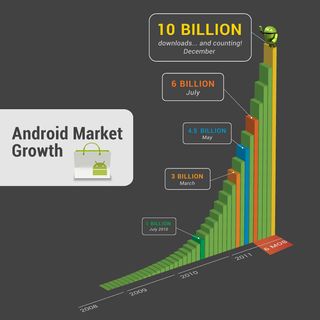Google Android hits 10bn app sales
Android Market sales reach 10 billion and Google celebrates by offering 10p apps.
Google's Android Market has seen 10 billion apps downloaded to date.
Google announced the milestone yesterday, saying it was seeing a growth rate of one billion app downloads per month.
To celebrate, the company has cut the price of a number of apps on the Android Market to 10p for 10 days.
"One billion is a pretty big number by any measurement. However, when it's describing the speed at which something is growing, it's simply amazing," said Eric Chu, director for the Android Developer Ecosystem, in a blog post.
"We can't wait to see where this accelerating growth takes us in 2012."
In October, ABI Research revealed the Android Market had overtaken the Apple App Store as the biggest seller o mobile apps.

Google's store took 44 per cent of all mobile app downloads in Q2 of 2011, compared to iOS's offering 31 per cent.
Get the ITPro. daily newsletter
Receive our latest news, industry updates, featured resources and more. Sign up today to receive our FREE report on AI cyber crime & security - newly updated for 2024.
Earlier in the year, Ovum predicted Android would take a "significant lead," with 8.1 billion downloads to Apple's six billion by the end of the year.
It appears Android has smashed predictions by almost two billion.
Not all good news
Google may be celebrating its app success, but Android still has its critics. One major complaint has been around lag, something an ex-Android intern attempted to answer on Google+ yesterday.
"It's not GC pauses. It's not because Android runs bytecode and iOS runs native code," said Andrew Munn, who said he will also be interning with a Windows Phone team next year. "It's because on iOS all UI rendering occurs in a dedicated UI thread with real-time priority. On the other hand, Android follows the traditional PC model of rendering occurring on the main thread with normal priority."
A lack of full hardware acceleration in most versions of Android also leads to the OS being a tad more laggy than other operating systems, Munn said.
Earlier in the week, Dianne Hackborn, an Android framework engineer, had claimed the Google OS does use some hardware acceleration.
"Many of the animations you see have always been hardware accelerated: menus being shown, sliding the notification shade, transitions between activities, pop-ups and dialogs showing and hiding, etc," she said.
Google also has a significant court case with Oracle, which is yet to reach a conclusion. If Oracle wins, Google could lose its grip on the OS. Oracle has accused Google's Android of infringing Java patents.
There are a host of other patent cases involving Android, which Google will have to fight off over the coming months and years if it wants to maintain the OS's dramatic rise.
Tom Brewster is currently an associate editor at Forbes and an award-winning journalist who covers cyber security, surveillance, and privacy. Starting his career at ITPro as a staff writer and working up to a senior staff writer role, Tom has been covering the tech industry for more than ten years and is considered one of the leading journalists in his specialism.
He is a proud alum of the University of Sheffield where he secured an undergraduate degree in English Literature before undertaking a certification from General Assembly in web development.





